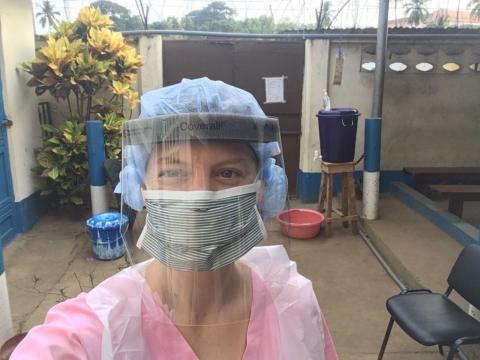By Dr Sandra Lako
It’s 6:45 am on a Monday. As I head out the door, I put on a cloth mask and make my way to the paediatric outpatient clinic at the Aberdeen Women's Centre in Freetown. Unlike many places in the developed world where outpatient services have switched to telemedicine, here in Sierra Leone due to limited connectivity we are still doing in-person consultations. It is the only way to keep essential health services going, which is vital in a country with some of the highest maternal, child and infant mortality rates in the world.
It goes without saying, safety is our priority: personal safety, colleagues’ safety and that of the patients and caregivers. This is not an easy task and takes considerable planning and resources. Hand hygiene, screening, personal protective equipment (PPE) and social distancing occupy my mind throughout the day. Psychologically it is challenging. Everyone I come into contact with potentially has COVID19.
On arrival I wash my hands and go through the screening process. Once screened, I enter the hospital compound and make my way to the children’s clinic. I wash my hands. After changing into my scrubs, I wash my hands again before I don personal protective equipment (PPE): head cover, mask, apron, face shield, gloves. Now I am safe, as long as I don’t touch my mask or my face and I wash my hands frequently.
I walk out of the clinic’s side gate and meet the line of patients waiting to be seen. Our first priority is triage and screening. Triage to ensure that the sickest children are seen first, and screening to identify any potential COVID19 cases to isolate them for testing. During this process we have to ensure that patients are socially distanced and masked up. Although it is made somewhat easier due to painted markings on the sidewalk and chairs placed at least a meter apart, it can be chaotic, requiring a lot of patience.
Screening takes time but eventually the patients enter the clinic; all wearing face masks. Next, one of the nurses does a health talk, using the time to educate the caregivers about corona virus and how to prevent it. Meanwhile I attend to very sick children in our observation room or, if there aren’t any emergency cases, I prepare my consultation room; disinfecting the table and chairs and making sure I have gloves and hand sanitizer. Finally, I start the general consultations.
Consultations are carried out as usual except that I consider every person to be a suspect case. Although we screen at the gate, we will miss cases, in particular asymptomatic caregivers. So, I make sure the caregiver and child are sitting at least a meter away from me and I keep my mask and face shield on, using gloves for every patient contact followed by hand hygiene. This process repeats itself until every patient has been seen, either by my colleagues or myself.
After all of the patients leave, I remove my face shield for disinfection and reuse, wash my hands and attend to administrative tasks, trainings and meetings. My mask is kept on, because even those I work with are suspects. Anyone could be an asymptomatic carrier.
It’s time to clock out. I doff any remaining PPE, wash my hands, change my clothes, put on a cloth mask and make my way home. On entering my compound, I wash my hands before heading indoors. The workday is done and I can only hope that I kept myself safe today.
All across Sierra Leone, healthcare workers continue to provide essential health services, as well as COVID19 care. Please pray for courage, safety and perseverance.
Dr Sandra is a paediatrician who has been working in Sierra Leone for 15 years.
Copyright © 2020 Politico Online








